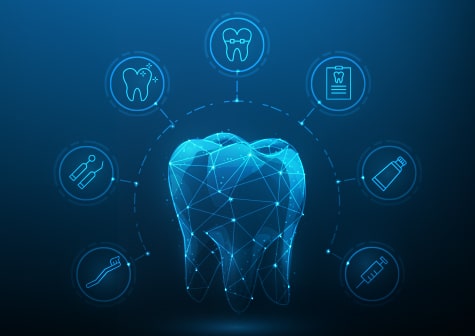
Artificial Intelligence in Dentistry is rapidly transforming the landscape of dental care. From early detection of dental issues to enhancing treatment planning and providing personalized care, AI technologies are reshaping how dentists approach oral health. In this article, we will explore the impact of AI in dentistry, focusing on its role in improving diagnostic accuracy, streamlining treatments, and offering a more tailored experience for patients.
AI for Early Detection of Tooth Decay
Tooth decay, also known as dental caries, is one of the most common oral health issues. Early detection is crucial to prevent extensive damage and to ensure timely treatment. Traditional diagnostic methods, such as visual inspection and X-rays, can sometimes miss subtle signs of decay. However, AI-powered imaging systems are now enabling dentists to detect tooth decay at its earliest stages with greater accuracy.
AI algorithms can analyze dental X-rays and intraoral scans in a fraction of a second, identifying signs of cavities, cracks, and lesions that might not be visible to the naked eye. By analyzing patterns in dental imaging data, AI can offer a more precise and reliable diagnosis, allowing dentists to implement preventive measures before decay spreads.
Artificial Intelligence in Dentistry: The Role of AI in Treatment Planning
AI is also changing the way dental treatments are planned. Digital dentistry, which incorporates advanced technologies like CAD/CAM (computer-aided design and computer-aided manufacturing), uses AI to create highly accurate 3D models of a patient’s mouth. These models are used to plan procedures such as crowns, bridges, and implants.
AI assists in optimizing treatment plans by simulating how a patient’s teeth and gums will respond to specific interventions. It can also predict how changes in one area of the mouth may affect the overall bite and alignment. By using AI-powered digital tools, dentists can offer a more efficient and effective approach to treatment, ensuring better outcomes for patients.
AI and Personalized Dental Care
One of the most exciting aspects of AI in dentistry is the ability to offer customized, patient-centered care. AI systems can analyze vast amounts of patient data, including medical history, oral health records, and genetic information, to create personalized treatment plans.
For example, AI can help in determining the most appropriate orthodontic treatment for an individual based on their unique oral anatomy and lifestyle preferences. Similarly, AI can be used to recommend preventive measures and home care routines tailored to each patient’s specific needs, helping them maintain optimal oral health in the long term.
Moreover, AI-powered virtual assistants are also enhancing patient care by providing 24/7 access to information. Patients can interact with AI-driven chatbots to get answers to common questions, book appointments, or even receive reminders about their next check-up or treatment.
The Benefits of AI in Dentistry
The integration of AI in dental care brings numerous benefits, not just for patients, but also for dental professionals. Here are some of the key advantages:
- Improved Accuracy and Precision: AI enhances diagnostic accuracy, minimizing human error and ensuring more precise treatments.
- Faster Treatment Planning: AI tools can speed up the process of treatment planning, reducing time spent on diagnostic procedures and allowing for quicker interventions.
- Cost-Effective Solutions: By reducing the risk of misdiagnosis and improving the efficiency of treatments, AI can help reduce costs associated with dental procedures.
- Enhanced Patient Experience: Personalized care, faster treatment times, and virtual assistance improve the overall patient experience, making dental visits more convenient and comfortable.
The Future of AI in Dentistry
The role of AI in dentistry is still in its early stages, but it is clear that it will continue to evolve and play a central role in shaping the future of oral healthcare. As AI technology advances, we can expect even more breakthroughs in diagnostic tools, treatment planning, and patient care.
AI-powered robotics could potentially assist in performing complex dental surgeries with greater precision, while AI algorithms may become even more adept at predicting and preventing oral health problems before they occur. In the future, AI may also help dentists create 3D-printed dental implants and crowns that perfectly match the patient’s unique oral anatomy, offering a truly personalized solution.
Conclusion
Artificial intelligence is undoubtedly transforming the field of dentistry, making dental care more accurate, efficient, and personalized. From early detection of tooth decay to advanced treatment planning and personalized care, AI is enhancing the way dental professionals approach oral health. As AI technology continues to improve, it holds the potential to provide even more innovative solutions that will improve patient outcomes and make dental care more accessible and affordable.

